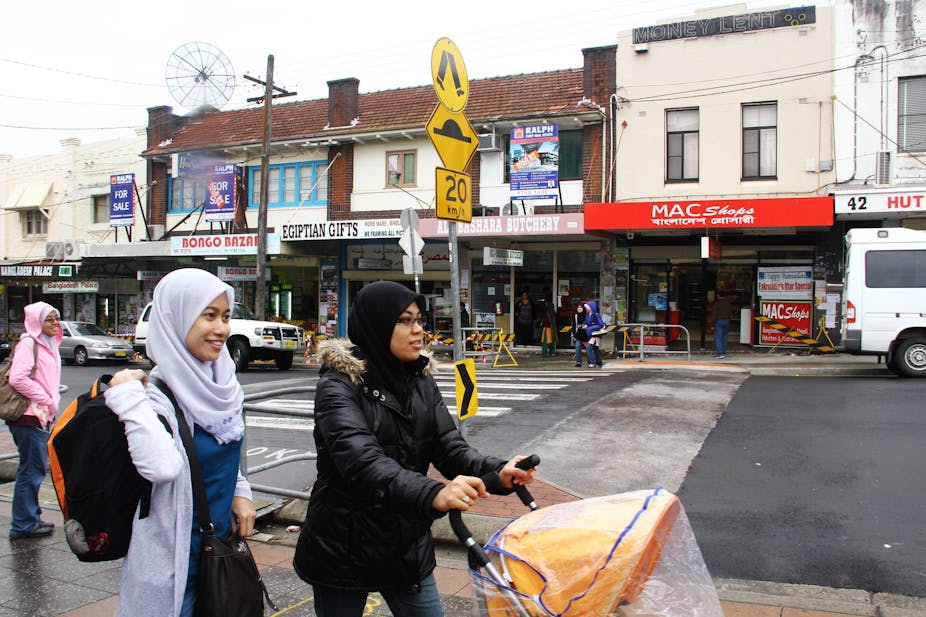Events in the Middle East that have both shocked and horrified us seem to have opened the doors to anyone who wants to criticise Islam, raise concerns about multiculturalism and romanticise an age when Australians was made up of “real Australians”.
In yesterday’s Sydney Morning Herald, for example, we find Paul Sheehan re-writing history: claiming that the Cronulla Riots in 2005 were the result of one-way Muslim thuggery and part of a growing “jihad” against Australia.
The Age’s National Affairs Editor, Tony Wright took the position that the shooting death of Numan Haider was an open and shut case because he waved an ISIS flag some weeks before. Regardless if any links are established between this young man and extremists, it seems that Haider’s religion is enough to remove any presumption of innocence.
We can also find Kevin Donnelly in the Fairfax press lamenting the loss of Australian identity from the 1950s due to the rise of multiculturalism. Donnelly attacks post-modernism, cultural relativism and the inability for us to be able to label things as “Un-Australian”, and demands that we spend more time teaching what it means to be Australian at schools.
Donnelly presents a shopping list of cultural grievances that he feels post-modern cultural relativists have allowed to flourish in Australia: child brides, female genital mutilation and religious intolerance.
While the article could be mistaken for a caricature of an anti-immigration leaflet, it does raise an important question: how do we teach what it means to be Australian and democratic values?
To answer, let’s begin by highlighting how we should not teach it.
Donnelly praises the Howard government’s Discovering Democracy program that delivered civics education between 1997 and 2004. He claims it was derided and abandoned because it was “conservative”. Actually, the program was an abject failure not because it was “conservative”, but because it was badly planned, designed and implemented.
Just how much of a failure? While the federal government provided A$31 million of funding between 1997 and 2004, national testing of students in 2004 demonstrated that 92% of Year 6 students and 60% of Year 10 students failed to acquire the minimum proficiency levels required.
After more than seven years of Discovering Democracy, the program failed to register any discernible understanding of Australia’s democratic institutions.
There are many reasons why this program failed but I will list three:
1) It treated young people as “citizens-in-waiting”. That is, it removed any sense of agency by claiming citizen rights could only be accessed when you turn 18. This failed to recognise the active political role that young people play in our society: from volunteering to political organising around issues they consider important.
2) It presented a sanitised view of democracy. Democracy is messy and Australian democracy is full of mistakes, errors and wrong turns as well as successes that need to be celebrated. Young people need to wrestle with these complex discussions and be allowed to form opinions not always favourable to mainstream society.
3) How do we teach democracy in the undemocratic setting of the classroom? There is a hypocrisy here that makes the celebration of democratic values somewhat hollow.
Studying democracy is not about rote learning that Australia has two houses of parliament, the constitutional, the head of state or anything else. It is about immersing oneself in democratic values and activism, and being encouraged to challenge the status quo.
If we are serious about teaching Australian democratic values in schools, then we need a project based curriculum that allows the students to not only celebrate Australia, but feel uncomfortable about the darker elements of our history: the displacement and murder of Australia’s Aboriginal people; the White Australia policy, the illegal invasion of Iraq and so on.
Teaching democracy is about complexities, successes and failures – ones we have made in the past and ones we are making now. As citizens of a democracy we should be both celebrating the openness of our society as well as challenging our government to justify itself: from its surveillance strategies to its flaunting of the United Nations Conventions on Refugees.
I know what I think it means to be Australian and I feel comfortable sharing this with the many young people in my lecture room. But as part of that, I challenge them to disagree with me and form their own opinions after considering various positions. The results are not always what I expect or agree with.
Unless we take a warts and all view of history and democracy that is open to challenge, then young people will interpret the kind of civics education that Donnelly proposes for what it is: propaganda.

